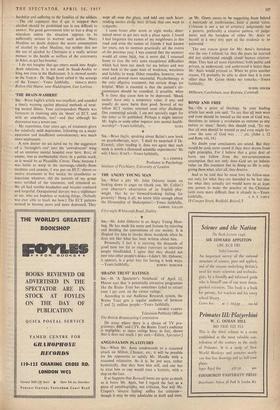'THE BRAIN-WASHERS' .
S112,—Brian Inglis's article was excellent, and sounded a timely warning against physical methods of treat- ing mental illness. Your correspondent Phoenix was fortunate in receiving only six 'doses' of ECT, and with an aruesthetic, too!—and that although his depression was a severe one.
My experience, four years ago, of treatment given for relatively mild depresSion, following on a major operation and insufficient convalescence, was much more unpleasant.
A new doctor (to us) lured me by the' suggestion of a 'fortnight's rest' into the 'convalescent' wing of an immense mental hospital 'near here. Rest, of course, was as unobtainable there, in a public ward, as it would be at Piccadilly Circus. Then., because I was liable to weep in the mornings, chiefly- from tiredness and amemia, I was put on ECT; eleven-or twelve treatments in 'five weeks; • no anzstheties or injections whatever. -All the patients. of my group were terrified of the treatment, and remained' so. We all had terrible headaches and became confused. and forgetful. Occupational therapy was a nightmare to me, who am hopeless at making things. (Nobody was ever able to teach me how.) The ECT patients seemed to become more and more depressed. They wept all over the place, and told one such heart- rending stories aboat their ill-luck that one wept in sympathy. I came home after seven or eight weeks, deter- mined never to get into such a place again. I found I had forgotten the names of my neighbours in this road and even the names of friends I had known for years, not to mention practically all the events of the previous year. I was assured that the memory would all come back, but it never did. 1 returned home to face the very same exceptional difficulties which had been too much for me before and was soon -back in the same state of weakness, weariness and, liability to weep. Other remedies, however, were tried and proved more successful. Psychotherapy is the only' effective treatment, but certain drugs are helpful. What is essential is that the patient's cir- cumstances should be remedied, if possible, when h, t is these that cause him to be depressed. 'Shock tactics' have only a temporary value, if any, and usually do more harm than good. Several of my fellow ECT victims returned soon after discharge. One committed suicide. I am not specially eager for this letter to be published. Perhaps it might interest Mr. Inglis or some other inquirer into mental health- manship?—Yours faithfully, - ILCRA






























 Previous page
Previous page